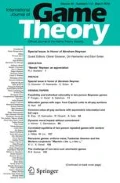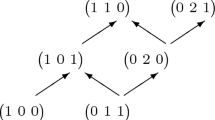Abstract
This paper contributes to the program of numerical characterization and classification of simple games outlined in the classic monograph of von Neumann and Morgenstern. We suggest three possible ways to classify simple games beyond the classes of weighted and roughly weighted games. To this end we introduce three hierarchies of games and prove some relationships between their classes. We prove that our hierarchies are true (i.e., infinite) hierarchies. In particular, they are strict in the sense that more of the key “resource” (which may, for example, be the size or structure of the “tie-breaking” region where the weights of the different coalitions are considered so close that we are allowed to specify either winningness or nonwinningness of the coalition) yields the flexibility to capture strictly more games.
Similar content being viewed by others
References
Beimel A, Tassa T, Weinreb E (2005) Characterizing ideal weighted threshold secret sharing, theory of cryptography. In: Lecture notes in computer science vol 3378. Springer, Berlin, pp 600–619
Blakley GR (1979) Safeguarding cryptographic keys. In: Proceedings of the national computer conference vol 48 AFIPS, Monval, pp 313–317
Elgot CC (1961) Truth functions realizable by single threshold organs. In: Proceedings of the second annual symposium on switching circuit theory and logical design. Detroit, MI, pp 225–245
Freixas J, Puente MA (2008) Dimension of complete simple games with minimum. Eur J Oper Res 188: 555–568
Freixas J, Molinero X (2009) Simple games and weighted games: a theoretical and computational viewpoint. Discr Appl Math 157: 1496–1508
Gvozdeva T, Slinko A (2011) Weighted and roughly weighted simple games. Math Soc Sci 61: 20–30
Isbell JR (1956) A class of majority games. Q J Math 7: 183–187
Muroga S (1971) Threshold logic and its applications. Wiley, NY
Richardson M (1956) On finite projective games. Proc Am Math Soc 7: 458–465
Shapley LS (1962) Simple games: an outline of the descriptive theory. Behav Sci 7: 59–66
Taylor AD, Zwicker WS (1992) A characterization of weighted voting. Proc Am Math Soc 115: 1089–1094
Taylor AD, Zwicker WS (1999) Simple games. Princeton University Press, Princeton
von Neumann J, Morgenstern O (1944) Theory of games and economic behavior. Princeton University Press, Princeton
Author information
Authors and Affiliations
Corresponding author
Rights and permissions
About this article
Cite this article
Gvozdeva, T., Hemaspaandra, L.A. & Slinko, A. Three hierarchies of simple games parameterized by “resource” parameters. Int J Game Theory 42, 1–17 (2013). https://doi.org/10.1007/s00182-011-0308-4
Accepted:
Published:
Issue Date:
DOI: https://doi.org/10.1007/s00182-011-0308-4




